The Han Chinese colonization of Taiwan began at certain points on the west coast, the most famous being Tainan and Lukang. Settlers then moved up waterways to places like Bangka (艋舺, these days known as Wanhua 萬華). However, one of Taiwan’s most characterful old towns isn’t near the sea, nor by a navigable river.
Beipu (北埔) is in the half of Hsinchu County that hasn’t seen much industrialization. The population has been in decline since the early 1980s, and now fewer than 9,400 people live here. Almost all of them are Hakka, yet the name of Beipu’s oldest building is evidence of a multiethnic past.
The single-story, 530-ping Jinguangfu Hall (金廣福公館) was named for the group established in 1835 to organize and defend Han settlers in Beipu and parts of what are now Baoshan (寶山) and Emei (峨眉) townships. Located at 6 Jhongjheng Road (中正路) and recognized as a first-grade relic of national importance, Jinguangfu is open from 9am to 5pm every day. There’s an admission charge of NT$30.
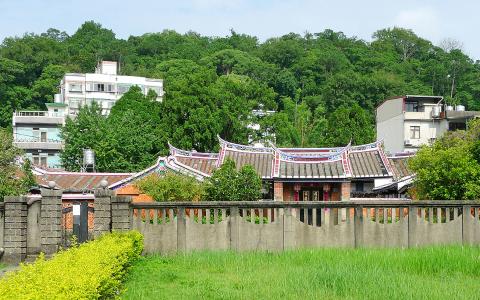
Photo: Steven Crook
The first character (“gold” or “money”) expressed a hope that the pioneers would prosper. The second (an abbreviation for Guangdong, 廣東, province in China) alluded to the Cantonese background of one of the two co-leaders. The third, short for Fujian (福建), was chosen because the other principal was a Hoklo man.
The latter, Lin Te-hsiu (林德修), played no important role after 1836. By contrast, his Hakka counterpart, Chiang Hsiu-luan (姜秀鑾, 1783-1846), retained his position until his death, and his descendants continue to enjoy local prominence.
Before moving to Beipu, Chiang had earned a reputation for organizing effective defenses against indigenous people who objected to having land and natural resources taken from them by Han Chinese migrants. The danger around Beipu was very real. In a single incident in July 1835, Aborigines surrounded and massacred 80 to 90 pioneers. During 1837, more than 40 people were killed by headhunters.
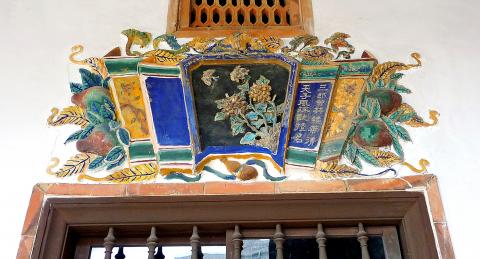
Photo: Steven Crook
In light of this history, it’s odd that one of Jinguangfu’s most intriguing features is neither labelled, nor mentioned in the bilingual leaflet offered to visitors. On either side of the main entrance there are knee-height snipers’ loopholes. It was explained to me that this made it easier for those inside to shoot intruders trying to batter down the door without killing them, thereby avoiding the legal consequences of causing a death. In Qing-era Taiwan, it seems, “stand your ground” laws weren’t quite as householder-friendly as they are in 21st century Florida.
Sporadic violence was a feature of life in Beipu until the early part of the 20th century. One of Chiang Hsiu-luan’s great-grandsons, Chiang Shao-tzu (姜紹祖), apparently committed suicide in the summer of 1895 after an unsuccessful guerilla campaign against the Japanese then taking control of Taiwan.
Another member of the same generation gained a reputation for public-spirited generosity. Chiang Chen-chien (姜振乾) donated money to schools and temples, and to alleviate suffering after natural disasters. He gave clothing and medicine to the poor, and provided wood so those who died penniless wouldn’t lack coffins.
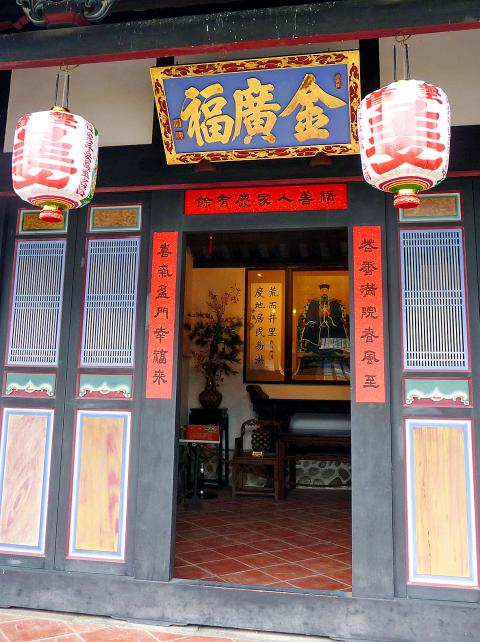
Photo: Steven Crook
More importantly, Chiang Chen-chien intervened in late 1907 when Japanese Army units converged on Beipu, determined to extinguish an uprising that had begun on Nov. 15. On that date, Tsai Ching-lin (蔡清琳) led a band of around 150 Taiwanese to murder 57 Japanese, among them the local postmaster.
During their sweeps through the countryside, Japanese soldiers and police killed dozens of innocent people. Chiang urged the colonial forces to show restraint; to show his sincerity, he offered to cover the forces’ entire expenses during the operation. At the same time, he communicated with local anti-Japanese elements, asking them not to make life more difficult for civilians caught in the middle.
The worst Japanese atrocity occurred in Neidaping (內大坪), where colonial troops killed over 100 people, including the majority of males aged 19 to 79. You’ll pass through the village if you leave Beipu via County Route 37, the route that leads to Beipu Cold Spring (北埔冷泉) and onto Miaoli County.
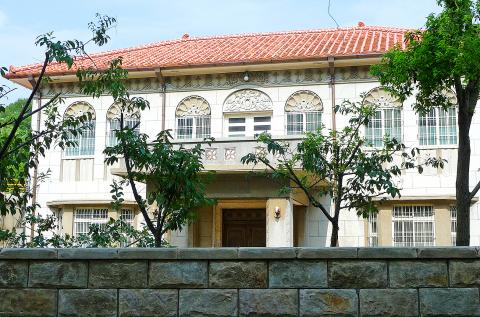
Photo: Steven Crook
At the end of November, Tsai was betrayed by the Saisiyat Aborigines who had joined his uprising. They killed him and delivered his body to the authorities. The rebellion achieved nothing, but after World War II it was celebrated as the first episode of armed Han Chinese resistance to Japanese rule in Taiwan.
During the colonial era, when Beipu boomed thanks to coal and camphor, one member of the Chiang clan founded what later became Hsinchu Bus Company.
Yet another, Chiang A-Hsin (姜阿新), oversaw the building of the two-story mansion which now bears his name at 10 Beipu Street. His tea export business was thriving, so in 1946 he decided to commission the design and construction of a home where his British and Japanese customers would feel comfortable. Renovation work on this landmark is running behind schedule but it should be open to the public before the end of this year.
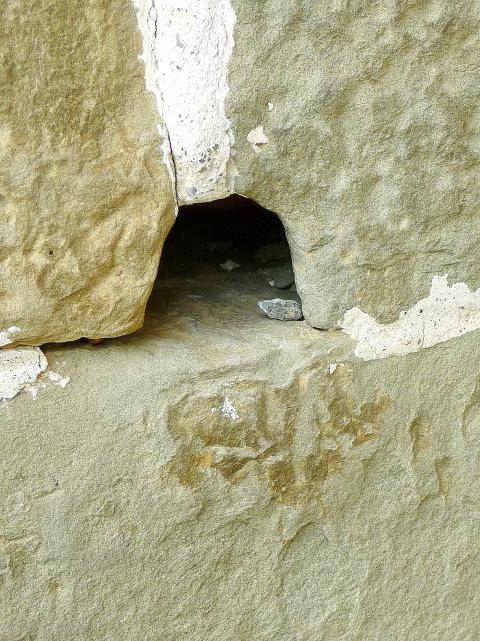
Photo: Steven Crook
Since 2014, the township mayor has been Chiang Liang-ming (姜良明). He’s the fifth person with that family name to hold the office since 1945.
You’ll need a car or a motorcycle to make the most of Beipu’s gorgeous hinterland. But even if you’re depending on buses and unwilling to walk more than a few hundred meters, you’ll find the town itself well worth visiting.
The residence known as Tianshuitang (天水堂) at 1 Jhongjheng Road is over 170 years old and exquisitely traditional. The Chiang branch that owns it has never opened the doors to the public, but if you explore the alleyways around here you can appreciate the exterior from various angles.
Walking south will bring you to the old home of a local scholar. Zhongshu Hall (忠恕堂) at 20 Gongyuan Street (公園街) dates from 1922 and is considered a fine example of Hakka architecture. There’s no admission charge but opening hours are limited (Friday to Sunday, 10am to 11:30am and 1pm to 4:30pm).
Another building falling into the intriguing-yet-off-limits category stands across the road. The permanently-shuttered Deng Nan-guang Photo Memorial (鄧南光影像紀念館) celebrated the life and work of Beipu native Deng (1907-1971).
The photos of daily life he took throughout Taiwan are regarded as an invaluable record of a time before camera ownership became widespread. Anyone with a passion for the past — and if you’ve come to Beipu, you’re probably that kind of person — will hope that one day the memorial can reopen.
Steven Crook has been writing about travel, culture, and business in Taiwan since 1996. Having recently co-authored A Culinary History of Taipei: Beyond Pork and Ponlai, he is now updating Taiwan: The Bradt Travel Guide.

April 14 to April 20 In March 1947, Sising Katadrepan urged the government to drop the “high mountain people” (高山族) designation for Indigenous Taiwanese and refer to them as “Taiwan people” (台灣族). He considered the term derogatory, arguing that it made them sound like animals. The Taiwan Provincial Government agreed to stop using the term, stating that Indigenous Taiwanese suffered all sorts of discrimination and oppression under the Japanese and were forced to live in the mountains as outsiders to society. Now, under the new regime, they would be seen as equals, thus they should be henceforth

Last week, the the National Immigration Agency (NIA) told the legislature that more than 10,000 naturalized Taiwanese citizens from the People’s Republic of China (PRC) risked having their citizenship revoked if they failed to provide proof that they had renounced their Chinese household registration within the next three months. Renunciation is required under the Act Governing Relations Between the People of the Taiwan Area and the Mainland Area (臺灣地區與大陸地區人民關係條例), as amended in 2004, though it was only a legal requirement after 2000. Prior to that, it had been only an administrative requirement since the Nationality Act (國籍法) was established in

With over 80 works on display, this is Louise Bourgeois’ first solo show in Taiwan. Visitors are invited to traverse her world of love and hate, vengeance and acceptance, trauma and reconciliation. Dominating the entrance, the nine-foot-tall Crouching Spider (2003) greets visitors. The creature looms behind the glass facade, symbolic protector and gatekeeper to the intimate journey ahead. Bourgeois, best known for her giant spider sculptures, is one of the most influential artist of the twentieth century. Blending vulnerability and defiance through themes of sexuality, trauma and identity, her work reshaped the landscape of contemporary art with fearless honesty. “People are influenced by

Three big changes have transformed the landscape of Taiwan’s local patronage factions: Increasing Democratic Progressive Party (DPP) involvement, rising new factions and the Chinese Nationalist Party’s (KMT) significantly weakened control. GREEN FACTIONS It is said that “south of the Zhuoshui River (濁水溪), there is no blue-green divide,” meaning that from Yunlin County south there is no difference between KMT and DPP politicians. This is not always true, but there is more than a grain of truth to it. Traditionally, DPP factions are viewed as national entities, with their primary function to secure plum positions in the party and government. This is not unusual